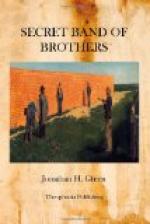Yours, —— ——.
100000 002000 300000 000004 000000 606600 000000 800008 000000
[This describes the bearer as being BOLD, ARTFUL, ACTIVE, TEMPERATE, LOW, and HEAVY, SANDY-COMPLEXIONED, by profession a MERCHANT; age from THIRTY to FORTY, QUICK-SPOKEN.]
No. 5.
Sugar Creek, October 24, 1825.
Esteemed Brown,—After two nights’ hard travelling, I find myself well provided for, in company with our old “Bogus Friend,” who informs me he has just returned from Toronto, Canada; and has brought some of the most splendid bogus I ever have seen, and sells it, in trade at 33-1/3, 28 in cash. I purchased two thousand of him, part trade, part cash; and he is to deliver it to you. He has sent a large quantity to Brookville, Indiana, and he will send your two thousand from Brookville. I let him have four horses, which I purchased from our Rising-sun Brethren. He sent them immediately to his lawyer, in or near Sandusky, who will forward them immediately to Michigan. I believe the horse trade is better, and a great deal more safe than the slave. There are many brethren living here, and of the best order, and live up to the principles of the Brotherhood; and of the many which live here, and in fact all through these parts, very few are considered other than men of the highest respectability. But I hear many making inquiry about our Lawrenceburgh Aurora, and Rising-sun brethren, and say the brethren have acted in many respects badly, and our friend —— ——, in the burgh, who purchased the pork he shipped from some of them; they say that he has deceived them. I feel mortified to think he has no more principle: I want you to call and tell him he must settle, and I think he ought to know the same without advice. They are the wrong men for him to try to gull; I have every right to suspect him of dishonesty, when I think how much the Brotherhood has done for him, you and I in particular, and know how he treated us; and though we have given him all of the start he has, he would sacrifice us both, with our families, for a hundred dollars. I have found out that Sulivan did not make his escape, as he assured us he did, but was




